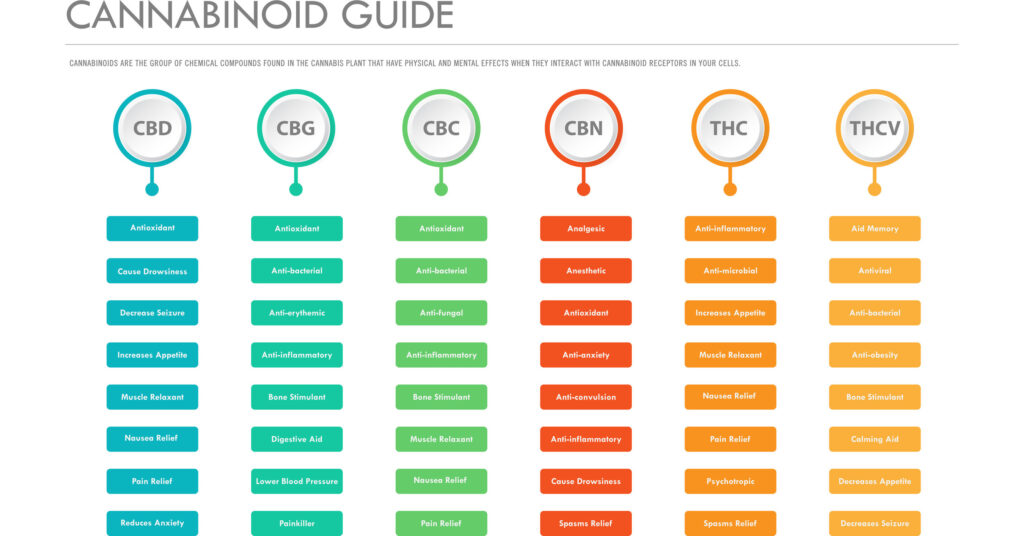Although the compound is often marketed as a new discovery, CBN has been around for quite a while. Dispensaries in legal medicinal and recreational states have recommended CBN extracts for years. Most CBN products focus on the cannabinoid’s usefulness as a sleep aid, but the compound shows promise for a host of additional therapeutic purposes.
Luckily, the passing of the 2018 Farm Bill and modern scientific innovations have made hemp-derived CBN available to almost the entire United States. But if you’re like most people, you’re probably wondering what CBN actually is and how it’s different from CBD.
Before we can get into the differences between CBN vs CBD, let’s take a closer look at what these compounds are and how they work.
Cannabinoids and the Endocannabinoid System
CBN and CBD are compounds called cannabinoids. So far, scientists have isolated 120 cannabinoids in hemp and other cannabis plants. Researching cannabinoids is a subject of increasing interest because of the compounds’ interactions with our body’s endocannabinoid system.

The endocannabinoid system evolved over 600 million years ago as a way to help living organisms maintain internal balance, a mechanism called homeostasis. The endocannabinoid system works through a network of receptors and compounds called endocannabinoids. This system of receptors serves as a master regulator for a wide range of vital functions, including:
- Fertility
- Body temperature
- Sleep cycles
- Moods
- Immunity
- Pain response
Cannabis compounds like CBN and CBD are known as phytocannabinoids. Like our internal cannabinoids, phytocannabinoids can interact and modulate the functioning of our endocannabinoid systems. Cannabis compounds can also help increase the levels of our natural endocannabinoids, which tend to get depleted with the stresses of our fast-paced modern lifestyles.
What is CBN?
Cannabinol (CBN) was the first cannabinoid isolated from cannabis way back in 1899. Originally, scientists thought that CBN was the active component that caused the characteristic “high” associated with the cannabis plant. Later, researchers discovered that the compound responsible for the psychoactive effects was actually delta-9 tetrahydrocannabinol (THC), not CBN.
THC makes a potent link with CB1 receptors in the brain, causing sometimes intense psychoactive effects. In contrast, CBN only creates about one-tenth of the bond with CB1 receptors, rendering the cannabinoid more or less non-psychoactive.
CBN is typically found in traditional cannabis strains rather than in low-THC hemp varieties. Although a small amount of CBN comes from the decarboxylation of the compound’s acidic form, CBNA, most CBN is produced as THC degrades when exposed to heat and light. Lack of proper cannabis storage probably accounts for why scientists at the turn of the century identified CBN first.
CBN vs CBD: Benefits
While both cannabinoids are non-intoxicating, each one produces a unique set of therapeutic benefits.
CBD’s Benefits
The most famous among CBD’s properties is its ability to help reduce seizures in patients with epilepsy. Currently, the only FDA-approved CBD drug is Epidiolex, a medication used to treat rare forms of epilepsy, such as Dravet’s and Lennox-Gastaut syndromes.
Mounting anecdotal evidence, lab research, and clinical studies are confirming a host of additional therapeutic benefits that CBD may offer. Like most cannabinoids, CBD can help reduce inflammation by modulating CB2 receptors in the immune system. The ability to reduce inflammation makes CBD potentially useful in alleviating body aches and pains.
CBD’s interaction with 5-HT1a receptors means that the compound can increase serotonin production, which may help with anxiety, depression, and stress-related insomnia. Laboratory studies have also concluded that CBD may be a more potent antioxidant than vitamin C. Additionally, CBD may have anti-cancer properties and can help combat the nausea and vomiting often provoked by chemotherapy treatments.
CBN’s Therapeutic Effects
CBN offers several of the same therapeutic benefits that CBD does, including lowering inflammation, reducing seizures, combating free radicals, and easing anxiety. Both CBD and CBN may also help combat antibiotic-resistant bacteria such as MRSA. However, CBN is most well-known as a sleep aid.
According to a 2011 clinical study from the British Journal of Pharmacology, CBN produces more sedative effects than its sister cannabinoids. A 2017 study, conducted by Steep Hill Genetics, found that it takes approximately half the amount of CBN to produce similar calming effects as the pharmaceutical drug diazepam (Valium).
Most experts agree that CBN can help with sleep without the next-day grogginess that melatonin produces. Some manufacturers are mixing CBN with small doses of melatonin to produce more effective sleep aids.
Similar to THC, CBN stimulates appetite and can help reduce intraocular pressure. CBN may offer a valuable alternative for chemotherapy and glaucoma patients who want to get the benefits of medical marijuana without experiencing psychoactive effects. Regarding appetite and intraocular pressure, CBD has the opposite effect, diminishing appetite and slightly increasing intraocular pressure.
One of CBN’s most surprising properties is its potential to help heal burns by stimulating TRPV2 receptors. Although more study is needed, researchers are investigating CBN’s potential as a topical burn treatment.
Another example of CBN’s remarkable potential lies in the way the compound appears to affect bone growth. CBN has demonstrated the ability to stimulate the production of fibroblastic colonies in bone marrow cells. Researchers hope that these findings will lead to future advances in the treatment of degenerative diseases like osteoporosis.
CBN vs CBD: Side Effects
Although both compounds are generally well-tolerated, CBN and CBD produce similar side effects when taken in higher dosages. Potential side effects include fatigue, diarrhea, and changes in appetite. CBN typically produces more drowsiness than CBD. Consumers should refrain from driving or operating heavy machinery after taking substantial quantities of either compound.
Additionally, cannabinoids may interact with prescription medications. Please consult your doctor before adding either CBD or CBN to your daily routine, especially if you regularly take pharmaceutical drugs.
Mixing CBD with CBN
It’s perfectly safe to take CBD and CBN at the same time. In fact, taking CBD and CBN together may be more efficient for easing certain types of pain. The reason is because of a phenomenon called the “entourage effect,” whereby the various cannabinoids, terpenes, and flavonoids work together to amplify each other’s therapeutic action. However, you may want to wait until the evening to take your daily dose of CBN, as the two cannabinoids together are likely to cause increased drowsiness.
CBN vs CBD FAQ
Hemp-derived CBN is federally legal according to the regulations outlined by the 2018 Farm Bill.
CBD is found in abundance in federally legal industrial hemp flowers. Unfortunately, CBN is more abundant in aged high-THC cannabis, which is still illegal on the federal level. Manufacturers in states where traditional cannabis is legal can force the oxidation process to produce more CBN. However, companies in non-legal states don’t have that option.
Hemp growers are hoping to breed high-CBN strains like they did with cannabigerol (CBG). Until then, we’ll be getting our federally legal CBN extracts through the isomerization process, and CBN extracts will continue to be considerably more expensive than CBD products.
Unfortunately, CBN may trigger a positive on a routine drug screening for cannabis. Most drug tests look for THC metabolites to indicate marijuana use. Because CBN is one of the compounds produced when THC ages, it shares many of the same metabolites as THC.
Although both CBD and CBN may help regularize sleep cycles, most experts agree that CBN imparts more sedative sensations and is better for sleep.

